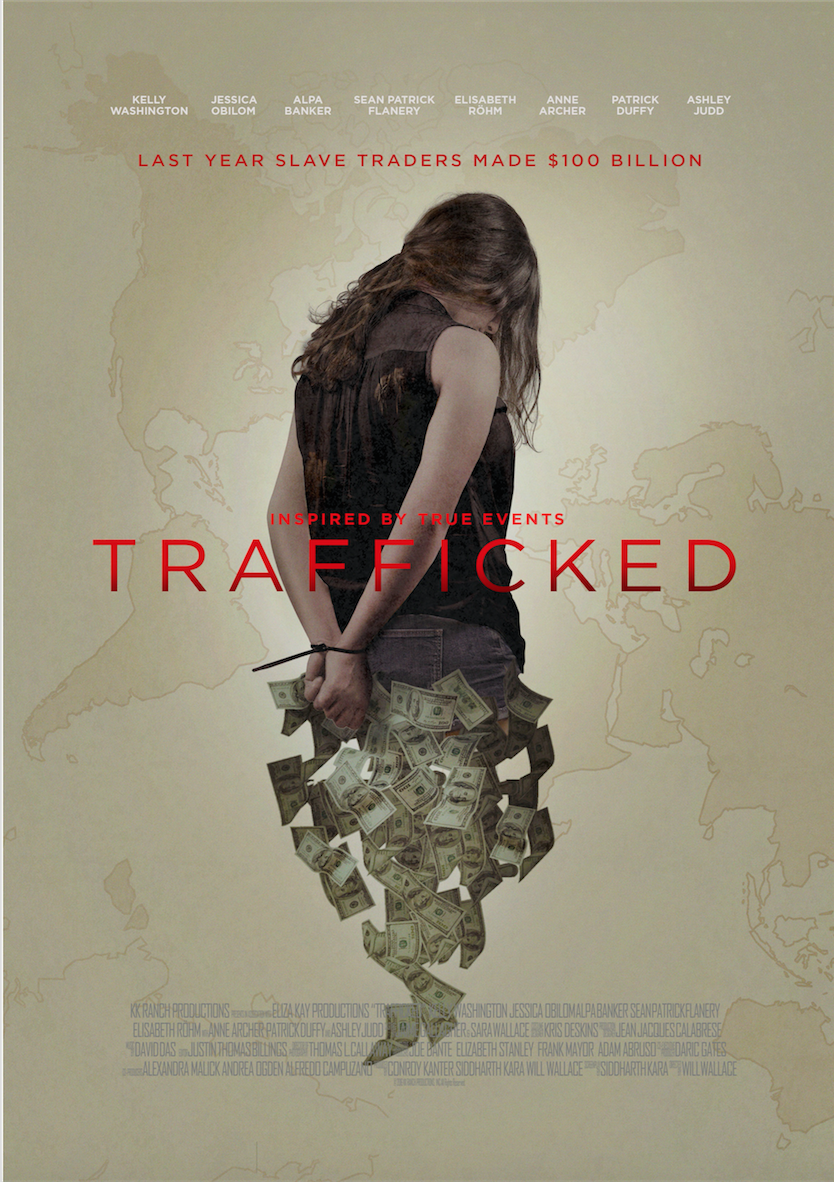On the evening of November 4, 2016, students, anti-trafficking experts, community members, and professionals from a wide variety of fields filled Banatao Auditorium at Sutardja Dai Hall for the advanced screening of Siddharth Kara’s feature film, Trafficked. There was standing room only, as over 150 people attended the event sponsored by The Blum Center for Developing Economies and the Institute for South Asia Studies.
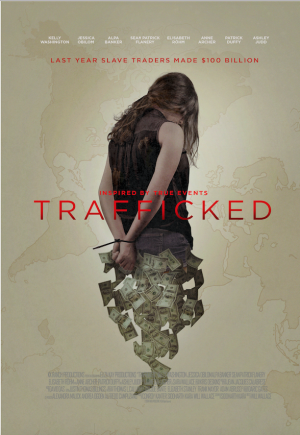
Prior to the screening, guests mingled and learned from community members about anti-trafficking initiatives on the UC Berkeley campus. Members of the student-run Anti-Trafficking Coalition at Berkeley were on-hand to provide information to attendees.
After the mixer, Director of Special Projects Heather Lofthouse kicked off the main event by giving a brief history of the Blum Center. Since the founding of the first center at UC Berkeley in 2006, there is now a Blum Center on all ten UC campuses. Collectively, these centers have offered courses to over 16,000 students, providing opportunities to engage in research or service in over 75 countries. Lofthouse also credited the American Himalayan Foundation (AHF) and their STOP Girl Trafficking initiative for helping make the screening possible.
Next, Hannah Ousterman and Kathy Brasil, co-directors of the Anti-Human Trafficking IdeaLab at the Blum Center, explained the work of their organization. The IdeaLab is an interdisciplinary think tank comprised of undergraduate and graduate students that focuses on researching sex trafficking, labor trafficking, and issues related to gender-based violence. The film screening is one of their main events this fall.
Brasil then introduced Siddharth Kara, the screenwriter and producer of Trafficked. Kara is an internationally renowned expert on human trafficking. He is a Fellow at the UC Berkeley Blum Center and Director of the Program on Human Trafficking and Modern Slavery at the Harvard Kennedy School of Government. Currently, Kara also advises the United Nations, foreign governments, and the US government on anti-slavery issues. Kara encouraged audience members to attend the Break Free Run in Oakland which takes place annually to raise awareness and funds to combat human trafficking. Kara also highlighted AHF’s STOP Girl Trafficking Initiative which was founded by Richard C. Blum and has helped 15,000 Nepali girls stay in school and avoid being victimized by traffickers.
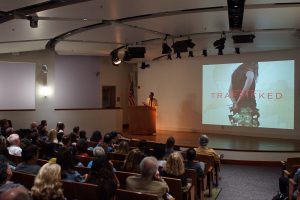
In relation to Trafficked, Kara explained that the film was inspired by his nonfiction book Sex Trafficking: Inside the Business of Modern Slavery. The purpose of the film, according to Kara, is to take audiences on an authentic journey introducing them to the brutal realities of human trafficking. Kara explained that most people who grow up in the United States learn about the transatlantic slave trade and the brave campaign to eradicate slavery that was inspired by movements in Europe. However, Kara insists that the 13th amendment was not the end, but just the beginning. Kara said, “Slavery still exists here and throughout the world more pervasively and perniciously than anyone wants to acknowledge. Slavery can be seen everywhere, from the food we eat, to the clothes we wear, to the smartphones in our hands, and to the young women raped by our friends, colleagues, and neighbors.” He continued, “Slavery strips people of what makes them human–their dignity, freedom, and even control over their own bodies.” Kara closed by saying that he hopes Trafficked will inspire people to join the efforts to end slavery.
After the film, Chloe Gregori, Program Assistant at the Blum Center, led a panel discussion with Siddharth Kara, cast member Patrick Duffy, trafficking survivor and anti-trafficking advocate Minh Dang, and Humanity United’s Investments Manager Sandy Tesch Wilkins.
Gregori started the panel off with a few prepared topics for each panelist before opening up the discussion to questions from the audience.
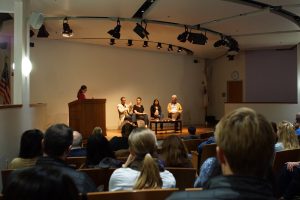
Panel Discussion
Siddharth Kara
“What led you to take on this project?”
When I wrote my first book, which was published in January 2009, I had the aspiration that the stories in the book could be told in a feature film format. I didn’t have any idea how to write a screenplay at first because I only had experience writing non-fiction books, but I knew that millions more people would see a film than know about me or come to one of my classes. Film is one of the most powerful tools we have to change things. Just look at films like Blood Diamond and The Killing Fields. My aspiration was to create a film that could be the center of gravity to change the narrative on human trafficking.
Given the large number of different types of trafficking, how did you choose the three types of trafficking featured in this film?
The challenge was to convey as much information as possible in a condensed film. I knew that I wanted to make a global film set in the United States. A global film because that is the reality of human trafficking, and set here because people don’t realize that side of trafficking. This country has the resources and energy to make an impact globally.
What are your hopes for how the film will help advance the anti-human trafficking movement?
My dream is that this film will capture the blood, sweat, and passion of enough people to do
whatever needs to be done to eradicate every form of slavery there is today. It is my hope that after seeing this film more people will think “Not on my watch. I will not pass this disease on to my children.”
Patrick Duffy
“How did you become involved in this film?”
I got a phone call to be part of this movie. I read the screenplay and found it intriguing and very depressing. The story is about the people next door. They are people you think are good but do the things my character did in the film. We all think of Ashley Judd with wings, but in this film she’s different. This film is another focus of what I do, which is to try to make something of value every day. For example, on our last day in Houston a woman had gone to a nail salon which is another common site for labor trafficking. The young Indonesian girl who did the woman’s nails shook her hand after the manicure and left a piece of paper with a phone number in her hand. The woman went back later on to find out if the girl was okay, but by then she was gone. Those opportunities to make a difference exist every day. I make an effort to keep my eyes open. If everyone does a little bit, we can have an enormous impact.
Sandy Tesch Wilkins
“Can you tell us more about Humanity United’s work?”
Within Humanity United, I specifically work with corporate supply chains. For example, some of the characters referenced having to pay off a debt or being recruited for a job that they thought was one thing (working on a cruise ship) but then being trafficked. Consumer products, agriculture, and construction are common areas for labor trafficking. Humanity United doesn’t have a particular geographic focus, so it does work in the US and outside of it.
“What are your reactions to the film?”
I was very impressed that they were able to weave so much into this film. It covers a lot about trafficking which is a complex problem that affects over 20 million people in the world.
Minh Dang
“Can you tell us more about your work on the United States Advisory Council on Human Trafficking?”
Human trafficking is an atrocity that requires our emotional connection to the issue and our best thinking. In our first report, one of the council’s recommendations was to look at representations of human trafficking in the US media. The media’s focus has largely been on trafficking outside the US. When the issue is portrayed in the US, sex trafficking is emphasized almost exclusively.
“How do you envision survivor leadership in the anti-trafficking movement?”
I am a survivor, but people often don’t think that survivors look like me and can be someone next door. People have been exposed to “disaster porn”–we are either desensitized to atrocities or are blown out of the water by how horrible it is. Survivors in leadership positions are trying to put a human face to the movement. We want to say that not only do survivors need to have a seat at the table, but they need to be leading what is happening.
Audience Q&A
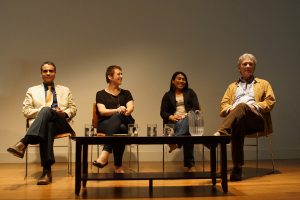
1) Audience member:“How do you talk to people who are feeling overwhelmed by the issue of trafficking?”
Dang: The first thing you should tell them is that the feeling of being overwhelmed is only 1% of what trafficking survivors experience. If survivors can endure 99% more, then they can work through their emotions. Second, you should give them action steps to deal with their feelings and help solve the issue.
2) MISSSEY representative: “How do you leave work at work when you are dealing with individuals who have gone through traumatic events in their lives like exploitation and trafficking?”
Dang: Self-care is not a singular act. Organizations should be designed to have the practice built in. You need to really find out what brings you joy and seek out other allies. Be able to step back from the work, and have accountability partners that help you follow through with your self-care like a gym buddy.
Kara: Anyone who does human rights work has to be very mindful. You are never the one who has suffered as much as the person you are meeting or documenting, but it does take an emotional, mental, and physical toll. I wasn’t that good about it early on. I didn’t realize that I needed to take the time to heal. [Self-care] requires a community and some help.
Ashley Judd did a Masters of Public Policy at the Kennedy School. She did a good deal of time in war zones and refugee camps. We spent time talking about how we didn’t take the time needed to rest and repair. Since then, I’ve focused on time with family and doing simple things like going to the movies. For any of you who are considering working in human rights, make self-care part of your journey because if you break down there is one less person doing that crucial work.
Duffy: I stand in awe of every person I’ve met who is on the front lines of addressing these issues, but there are people who may not be able to do that. However, they can still do something. For those of us who can’t muster the life condition to dedicate our lives the way the rest of this panel has, we can do something that is still valuable. We can be the people who represent the average, everyday folks. I’m a voice for us “weekend warriors.”
3) Counselor and Human Trafficking Researcher: “Do you know of any avenues for the resiliency of the counseling community in relations to addressing mental health concerns for survivors?”
Dang: Research on the mental health of survivors is an area that I myself want to learn more about. There are programs around the world that have worked with survivors over the long-term, but I don’t think that there are actually very good studies on it.
Wilkins: If you’re looking for specific NGOs for models, [Humanity United] works with the Alliance to End Slavery and Trafficking. There are a number of policies that they set forth that may be useful for you to look at.
4) Peter Bittner, Journalist: “What is the role of the media in shaping the public’s perception of issues like human trafficking?”
Duffy: It’s a tough question about the media and their responsibility for social issues. Film companies’ responsibilities are to their stockholders, but we need to hold our reporters and our network news accountable. We need to hold their feet to the fire. We have an avenue to do that: our social media networks. We make huge changes in our institutional norms through social media. I have long advocated that network news shouldn’t be rated. It should be standardized and not focused on making profit. If we did that, then that section of the media would fulfill their responsibility. However, for entertainment media, it’s a harder request. There are passion projects that have a positive effect such as Philadelphia and Blood Diamond, but they also attract a certain market. The aim is still to make profit.
Dang: There is a responsibility to stop using the term child prostitute. Not labeling survivors as prostitutes is the responsibility of the media.
5) Peter Bittner, Journalist: “Why did you choose to make a feature film instead of a documentary?”
Kara: There have been several well done documentaries on issues of trafficking, but very few commercially viable feature films. Feature films though can attract a much larger audience than a documentary ever will. Patrick [Duffy] can testify to how hard it is to make a movie and how hard it is to get people to see it. But if it can be done, you can capture a lot of attention and change the current. The current [of anti-trafficking work] is still largely trundling along. This isn’t a brisk river yet because more people need to jump in and help move it forward. If enough people get to hear about issues like this and look up various organizations like AHF and Humanity United, then something can change.
6) Audience member: “Can you comment on what needs to be done about all the men who actually go into the brothels?”
Kara: There was a conscious choice made in this film to show you the truth. It’s not just the
degenerate, perverse, unpleasant men of the world involved in this. It is doctors, lawyers, professionals, politicians, young men, and old men. But men aren’t all scoundrels. There was the quick-thinking bus driver who made all the difference in the climactic arc for two of the characters.
There are competing philosophies in this world about this issue. Is it prostitution or is it trafficking? Demand Abolition is an organization that follows the Nordic model in which Sweden was the first country to end the prosecution of trafficking survivors. They passed a law that didn’t make it a criminal offense to sell sex, but made it a crime to buy sex. The law has reduced incidents of trafficking. Other countries have followed this model such as France, but the other side [of the debate] says that prostitution must be made legal and that it should be regulated. This is not to say that people cannot make a fully informed, conscious choice to engage in sex work, but from my experience there have been factors such as poverty or hardship that has led them to this work. With these factors, how can we really know if they had a choice? The ultimate question in this debate is whose rights do we want to protect?
Dang: If we’re talking about ending demand and the people who are needing to survive
through sex work, what is our emancipation plan to help people lead a dignified life? This is a very complicated issue, and putting everyone in jail does not solve the problem.
We have to ask ourselves, “what is the culture we have that fosters the buying of another person?” Do people who grow up in the sex industry and choose to stay as adults really have viable options? What about the “bad men” who were raped as children or who were trained to treat people this way?
We need to evaluate how mothers treat their sons and how fathers treat their sons. We need to talk about early prevention. Action after the fact is not prevention. If sex work is legalized, it doesn’t necessarily decrease trafficking because trafficking just goes underground instead.
Wilkins: Partnership for Freedom sponsored by Humanity United is currently gathering ideas on whether countries should aim for decriminalizing or legalizing sex work as a solution to human trafficking. If you want to engage in this debate, you can submit your ideas there.
7) Audience member:“What direct actions can people take to help end human trafficking?”
Duffy: Have a conversation. People have sex a lot, but don’t talk about it. You can have a sex conversation with your child because then they can come to you with questions. You can have a brilliant conversation that can help change the cycle that leads to trafficking.
Dang: Google survivorsofslavery.org and hug somebody.
Wilkins: Look at a specific piece of clothing or product and find out where it comes from. It can be overwhelming to think of where everything comes from, but focusing on just one item will enlighten you and help you change your purchasing habits.
Kara: The focus of this film is on sex trafficking, but there were references in the film to labor trafficking. If you had done nothing else on this issue and knew nothing about it prior today, the fact that you were here tonight is already the first step. You are on the journey and are part of this community now. Maybe after this you’ll be able to go home and take that second step.
